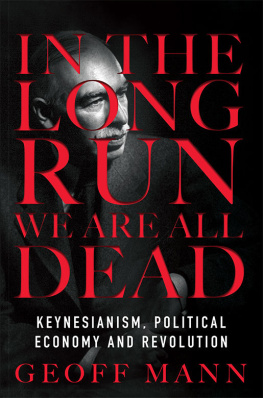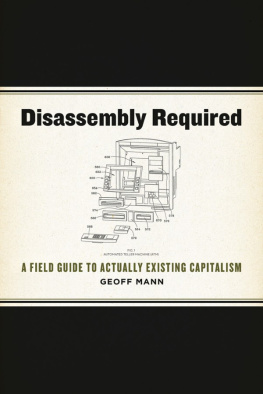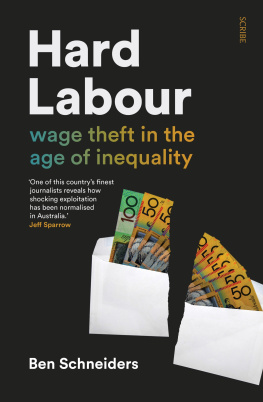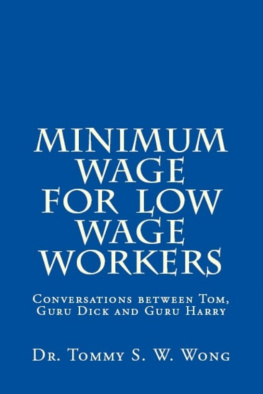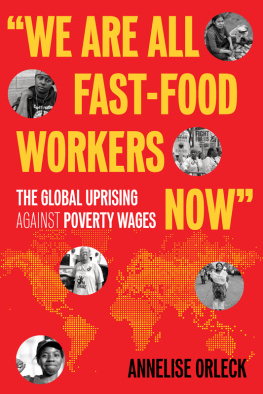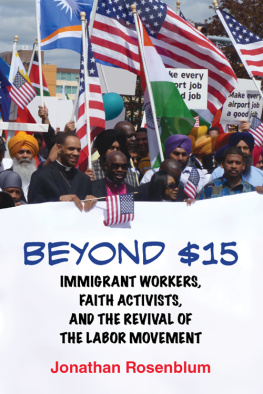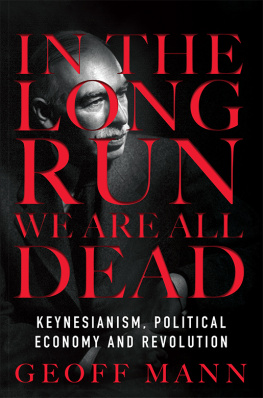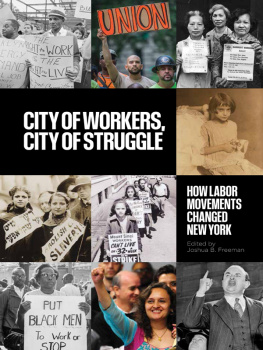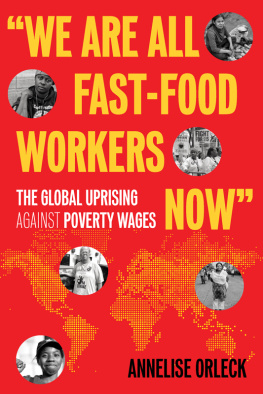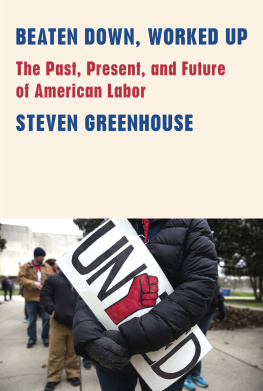2007 The University of North Carolina Press
All rights reserved
Manufactured in the United States of America
Designed and typeset in Plantin, Block, and Melior
by Eric M. Brooks
The paper in this book meets the guidelines for permanence and durability of the Committee on Production Guidelines for Book Longevity of the Council on Library Resources.
Library of Congress Cataloging-in-Publication Data
Mann, Geoff.
Our daily bread: wages, workers, and the political
economy of the American west / Geoff Mann.
p. cm.(Cultural studies of the United States)
Includes bibliographical references and index.
ISBN 978-0-8078-3134-2 (cloth: alk. paper)
ISBN 978-0-8078-5831-8 (pbk.: alk. paper)
1. Working classWest (U.S.)History 20th century. 2. West (U.S.)Economic policy 20th century. I. Title.
HD8072.M266 2007
331.297809041dc22 2007004541
cloth 11 10 09 08 07 5 4 3 2 1
paper 11 10 09 08 07 5 4 3 2 1
Preface
In the middle of winter, 1919, a brief news item appeared on page 3 of the Yreka Journal, a small-town newspaper in Siskiyou County, California. The county is in the northernmost part of the state, adjacent to Oregon, and since both southern Oregon and northern California were (and are) timber country, there was always a constant flow of people, money, and technology across the state line. The newspaper story, then, came as no great surprise to its readers, even if the jocular tone hinted at more serious movements in the region. Under the heading I.W.W. Influx Planned, the Journal printed the following account of recent events in the nearby mill town of Hornbrook:
On what appears to be very good authority, it is rumoured that unless their plans are changed a mob of I.W.W.s now organizing in southern Oregon will shortly invade Northern California. Whether or not these undesirables contemplate creating disturbances of any kind cannot be learned, but Siskiyou peace officers are prepared to receive the gentry properly.
Last week thirty-three members of the red card brotherhood dropped off at Hornbrook. Before they had a chance to make themselves very objectionable, however, the bunch was split up into small bunchlets by the officers and sent out of town in box cars. Two unusually stubborn ones, evidently enamoured of Hornbrook, were reluctant to leave. Persuasiona fourteen or sixteen inch hickory club answers the purpose admirablyled them to a change of convictions and they, too, went away.
If the crude violence of the peace officers attack on the Industrial Workers of the World (IWW) takes some of us aback, the explanation can only be navet.kind often reserved for the brutalization of African Americansseems to have been directed by the state and capital at the Wobblies, as the IWW was more familiarly known. More than the members of perhaps any other labor organization in North American history, Wobblies were beaten, jailed, shot, burned, driven out of town, even dragged from their beds and hung. Indeed, in the not infrequent cases in the South in which the Wobblies were also African American, the cruelty can shock even those who know very well what happened.
This is not a book about the Wobbliesthere are enough books on the IWW, and many of them are excellentbut I do hope it goes some way toward an analysis of that constellation of forces that determined the particular viciousness of these responses. For this is a book about the wage, about cracking open the wage relation and bringing to light its internal movements, its cultural and political content. It is not a book about wage determination, about how the rates and scales of payment are set for wage workers, or at least not primarily, although that of course comes up throughout. Instead, it is about the wage as a relation, a hotly contested political site in which quantity is only one of several critical dynamics at play. The Wobblies are important here because they were interested in the wage in a somewhat similar way. Certainly, they struck often, fought for higher wages, even bargained when they had to, but in contrast to virtually all other unions, they were ultimatelyand in this they came closer to Marxs Marxism than many othersagainst the wage. The preamble to the IWW constitution of 1905 reads, Instead of the conservative motto, A fair days wage for a fair days work, we must inscribe on our banner the revolutionary watchword, Abolition of the wage system.
To explain antipathy for the Wobblies by pointing to the fact that they were socialists, anarchists, communists, dissenters, pacifists, or Marxistswhich was often the casesurely will not suffice, since it begs the question why any of these groups are targets in the United States in the first place. The real reasons for the level of physical violence directed at the Wobblies are impossible to isolate, but they are certainly caught up in the same energies that suffuse, among other phenomena, the conservative populisms that continue to bubble to the surface in the United States. I think it not unreasonable conjecture to suggest that the Wobblies stance against the wagea position they took from within the wage itselfthreatened the natural white American order as it was (and is) fantasized in the West and that the unnaturalness of this radicalism partially legitimated the abuse of those who offended that order. Indeed, the natural appears to have been a point of considerable concern for anti-Wobbly forces. Despite the fact that in the West most of these workers were white, wherever and whenever the beatings, shootings, and forced removals of Wobblies took place, callous American racisms were more or less explicitly evoked over and over. The racial or national origins of the Wobbliesand of the unskilled, often itinerant workers among whom they found their greatest constituencywere frequently questioned by scholars, employers, and the state, as was their sexuality, intelligence, reliability, and honesty. Here, the echoes of African American history, although rooted of course in dynamics that are not the same as those involving the Wobblies (to put it mildly), are strong (for more on this, see chapter 4).
What matters to me, then, is the way in which the Wobblies anticapitalism makes the wagethat nexus of workers time and employers money they called the wage systemthe political pivot point in the mode of production. In the temple of capitalism, they claim, the wage is the central pillar. They explicitly reject the idea that the wage is reducible to some politically transparent quantity: it is the wage as relation that matters.
I agree. The wage is indeed perhaps the most important arena in the cultural politics of capitalism. However, as the chapters that follow demonstrate, what my analysis shares with the Wobblies is somewhat superficial, and I hope to show that there is a great deal more going on in the wage than they acknowledged. As they knew, Karl Marx once called the wage a golden chain, and it certainly is an essential component in capitals toolkit, but that comes nowhere near exhausting its meaning or power. Not only is the wage much more than an exploitative mechanism shaped by employers to extract value workers produce, but it is also an essential forum in which workers fight it out under capitalism. These fights always have a bearing on the quantitative distribution of income, i.e., wage determination, but they are never fully contained therein. There are always many other things at stake, not the least of which are absolutely crucial categories like race, gender, nation, class, individuality, and freedom (however we might conceive of them), and the list goes on. Sometimes, the wage relation itself is explicitly on the table, but almost all of the time it is not.


